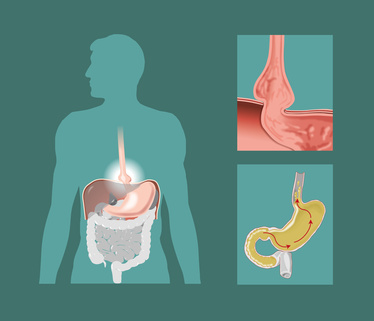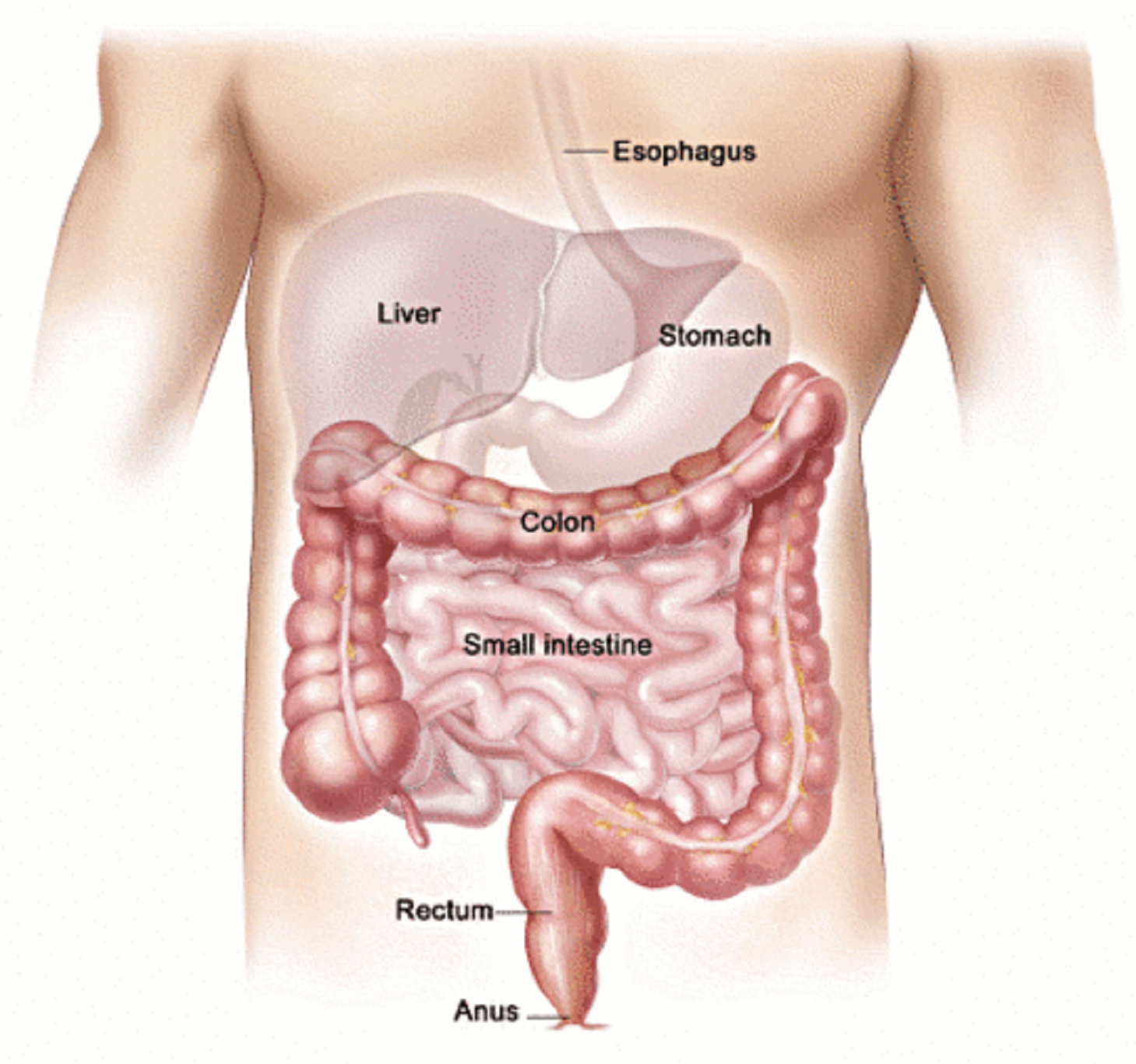What is Hiatus Hernia ?

A health article about Hiatus Hernia from Your Health Online the A to Z directory of dealing with Health Problems & nutritional Self Care Strategies
Hitaus Hernia can be defined as displacement of a portion of the stomach through the opening in the diaphragm through which the oesophagus passes from the chest to the abdominal cavity.
In this disease, a part of the upper wall of the stomach protrudes through the diaphragm at the point where the gullet passes from the chest area to the abdominal area.
The diaphragm is a large dome-shaped muscle dividing the chest from the abdominal cavity.
It is the muscle concerned with breathing, and it is assisted by the muscles between the ribs during exertion.
It has special openings in it to allow for the passage of important blood vessels and for the food channel, the oesophagus.
Hiatus hernia occurs at the oesophageal opening.
The disease is common after middle age.
It is estimated that about half the people above 60 years of age suffer from it, although most of them may not have any symptoms.
The correct diagnosis of haitus hernia can be arrived at by means of berium meal x-ray test.
(Also Called 'Paraesophageal Hernia', 'Sliding Hernia')

Signs & Symptoms of Hiatus Hernia
Hiatal hernia has often been called the "great mimic" because its symptoms can resemble many disorders.
For example, a person with this problem can experience dull pains in the chest, shortness of breath, heart palpitations and a sensation of any swallowed food "balling up" in your gut and causing discomfort in lower esophagus
Often, a hiatus hernia won't cause any symptoms. However, it may cause a feeling of warmth or burning in your chest, which is called heartburn.
This happens when the contents of your stomach, which are acidic, reflux (flow backwards) into your oesophagus.
Hiatus hernia is characterised by pain in certain areas.
The most common areas are behind the breast bone at the nipple level and lower, at the end of the breast one.
Pain may also occur on the left chest and this is often mistaken for angina.
If you have heartburn symptoms that go on for a long time or are severe, this is called gastro-oesophageal reflux disease (GORD).
Other symptoms include:
• Chronic strong pain / discomfort in your chest
• Belching / Burping
• hiccups
• gurgling noises in your chest.
Some people develop a croaky voice or asthma symptoms.
Your symptoms may start or get worse after eating, while lying down or when you bend forward.
Other areas of pain are the base of the throat, right lower ribs and behind the right shoulder
blade.
The pain increases when the patients stoops with efforts and lies down.
Other symptoms
of this disease are heart-burn, especially after a meal, a feeling of fullness and bloatedness,
flatulence and discomfort on swallowing.
But in most cases a hiatal hernia does not cause any symptoms.
The pain and discomfort experienced by sufferers is due to the reflux of gastric acid, air or bile.
While there are several causes of
acid reflux, it does happen more frequently in the presence of hiatal
hernia.
Types of Hiatus Hernia

Hernia is an abnormal protrusion of internal organs through an abnormal opening in the wall of the cavity.
A combination of increased pressure inside the body with weakness in the wall is responsible for this condition.
When an internal body part pushes beyond its confining wall into
any area where it does not normally belong it is classified as being a
hernia.
The hiatus is an opening in the diaphragm, the muscular wall separating the chest cavity from the abdomen.
In a normal case without a hernia the esophagus, or food pipe, goes
through the hiatus to drain into the stomach. In a hiatal hernia the
stomach bulges up into the chest through that opening.
In this condition internal organs or parts of organs are protruded out
forming a swelling which will increase the size with coughing and
lifting weight, and while passing stool and urine.
In lying down position the swelling goes inside except in strangulated and irreducible hernia.
Hernia can occur anywhere in the body.
However there are some common sites for hernia. Due to the presence of hard bony covering chest wall is normally not affected.
Hernia in the lower back is also rare due to spine and back muscles and tough ligaments and sheaths.
The common site for hernia is
the abdominal wall.
Compared to other parts the abdominal wall is weak due to the presence of some natural orifices.
There are some areas wherein the
abdominal muscles are weaker and thin and all these factors make a
chance for herniation.
The common sites for hernia are following.
a) Inguinal hernia:
Here the abdominal contents protrude through the inguinal canal (passage in the lower abdominal wall just above the inguinal ligament.
It is seen on either side).
This type is common in males. Initially the swelling comes only while straining and goes back while lying down.
Later the large portion of intestine may come out which may not go back easily.
b) Femoral hernia:
This type of hernia is more in females.
Here the abdominal contents pass through the femoral canal which is seen just below the junction between the thigh and lower abdominal wall (Inside the femoral triangle).
The contents pass downwards and comes out through saphenous opening in the thigh and forms a swelling under the skin.
c) Umbilical hernia:
This is common in children.
The umbilicus is the weaker part of the abdomen.
The contents of the abdomen may protrude as a bulb like swelling while crying and defecating.
d) Incisional hernia:
These hernias are seen in operated sites.
Due to improper suturing or sepsis the operated site becomes weak resulting in hernia.
e) Epigastric hernia:
Here the hearniation occurs in the epigastrium. It is a rare type.
f) Lumbar hernia:
Here the hernia appear in the lumbar area on either side of the lumbar spine (in the lumbar triangle).
g) Obturator hernia:
This is a rare type of hernia.
Here the contents pass through obturator foramen in the pelvic bone.
What Causes Hiatus Hernia?

The chief cause of the mechanical defect associated with hiatus hernia is faulty diet.
The
consumption of white flour, refined sugar and products made from them, such as cakes,
pastries, biscuits and white bread as well as preservatives, and flavourings devitalise the system
and weaken the muscle tone.
As a consequence, the muscles become less resilient, and connective and fibrous tissue suffers through poor nourishment, and thus become more prone to decomposition and damage.
This ultimately leads to disease like hiatus hernia.
Drinks like tea, coffee, alcohol, also affect the mucous lining of the stomach and irritate the
digestive tract.
These drinks, when taken with meals, encourage fermentation and produce gas.
This increases the distension of the stomach, causing pressure against the diaphragm and the
oesophageal opening and greatly increasing the risk of hemiation.
A Hernia tends to happen when the tough fibres that hold your gastro-oesophageal sphincter in place begin to stretch.
As a result, the muscles of your diaphragm caj also become more flexible.
Both of these tend to happen as you get older.
Around 1 in 3
people over 50 years of age have a small hiatus hernia, but it is
normally without any obvious or painful symptoms.
Whenever something happens that increases the pressure inside your abdomen it will likely also increase the size of your hernia.
This
includes any sharp physical movements like simple coughing, or vigorous
vomiting and straining; and you are at more risk when pregnant, or if
you are currently overweight or obese.
Other causes of hiatus hernia
include sedentary occupations, without sensible exercise, overweight resulting from overeating,
smoking, shallow breathing and mental and emotional tensions.
1. Weakness in the body wall:
a) Congenital weakness.
b) Acquired weakness due to injuries, wasting of muscles,
suppurative lesions in the wall and presence of weak natural openings,
obesity, lack of exercise, repeated pregnancy.
c) Surgical operation with improper suturing or sepsis of operated site.
2. Increased pressure inside the body:
a) Chronic constipation.
b) Recurrent cough.
c) Weight lifting.
d) Stricture of urethra.
Risk Factors:
Hiatal hernias occur more often in people over the age of 50, in overweight people (especially women), and in smokers.
Sometimes a hiatus hernia can lead to more serious problems.
1) Strangulation:
The blood supply to your stomach can also be affected if a segment of your stomach gets tightly trapped in your chest area.
If you have a rolling hiatus hernia, your stomach can become blocked, leading to pain and vomiting.
If the hernial orifice is narrow the abdominal contents may not go back easily, and later the blood flow to the herniated tissues may be blocked due to constriction.
This can cause death of protruded
intestine.
2) Intestinal obstruction:
This occurs when the whole portion of the intestine is protruded in to the hernial sac.
The narrow hernial orifice will block the passage
of bowels.
3) Infection and peritonitis:
If there is strangulation with death of a portion of intestine
there will be spread of infection to the abdomen resulting in
peritonitis.
4) Bleeding Ulcers:
Acid from your stomach contents can sometimes cause damage to the lower
end of your oesophagus.
This damage is made more likely by a hiatus
hernia and can lead to ulcers
If your ulcers bleed, you may vomit blood. A bleeding ulcer can also
lead to anaemia, a condition where you have too few red blood cells or
not enough oxygen-carrying haemoglobin in your blood.
In the long term, when ulcers have healed they can cause narrowing of
your oesophagus, which can make swallowing difficult and painful and
cause you to regurgitate food.
Prevention:

To prevent the occurrence of hiatus hernia you can apply the following strategies:
• Losing weight if you are overweight, and maintaining a healthy weight
• Having a common sense approach to eating, such as eating
moderate to small portions of foods; and limiting fatty foods, acidic
foods (such as tomatoes and citrus fruits or juices), foods containing
caffeine, and alcoholic beverages
• Eating meals at least 3-4 hours before lying down, and avoiding bedtime snacks
• Elevating the head of your bed by 6 inches (this helps allow gravity to keep the stomach's contents in the stomach)
• Not smoking
When to seek Medical Advice:

If your symptoms persist and you develop a chronic hiatus hernia, you
should see your doctor to get a referral to a specialist:
gastroenterologist for tests, which may include the following:
Endoscopy.
This allows a doctor to look inside the body using a narrow, flexible, tube-like telescopic camera called an endoscope.
Your doctor will use it to look closely at any sore spots or ulcers and can take a sample of tissue (a biopsy), if needed.
X-ray with barium.
This test involves swallowing a drink containing a substance called
barium, a powdered metal that illuminates the digestive organs during
X-rays.
You may also be asked for a sample of blood to check for anaemia.
Treatment/Therapy:

In most cases, sufferers experience no discomfort and no treatment is required.
However, when the hiatal hernia is large, or is of the
paraesophageal type, it is likely to cause esophageal stricture and
discomfort.
In the initial stages of hernia the following steps may be useful:
1) Use of hernia belt: Special types of hernia belts are
available for each type of hernia. This will prevent the protrusion and
will reduce pain.
2) Constipation, recurrent cough, urinary obstruction eyv should be treated.
3) Fat reduction will increase the strength of abdominal wall.
4) Abdominal exercises to increase the muscle tone.
5) Take plenty of leafy vegetables, fruits and fibrous diet for easy bowel movements.
6) Try other systems like Homoeopathy, Herbal medicine.
If no relief by the above steps consult a general surgeon for surgical management.
Where hernia symptoms are severe and chronic acid reflux is
involved, surgery is sometimes recommended, as chronic reflux can
severely injure the esophagus and even lead to esophageal cancer.
Surgical treatment.
In a small number of cases, a hiatal hernia may require surgery.
Surgery is generally reserved for emergency situations and for people who aren't helped by medications to relieve heartburn and acid reflux.
Hiatal hernia repair surgery is often combined with surgery for
gastroesophageal reflux disease.
An operation for a hiatal hernia may involve pulling your stomach
down into your abdomen and making the opening in your diaphragm
smaller, reconstructing a weak esophageal sphincter, or removing the
hernia sac.
In some cases, this is done using a single incision in your chest wall (thoracotomy) or abdomen (laparotomy).
In other cases, your
surgeon may insert a tiny camera and special surgical tools through
several small incisions in your abdomen.
The operation is then performed while your surgeon views images
from inside your body that are displayed on a video monitor
(laparoscopic surgery).
The following operations are done depending up on the type and nature of hernia.
1) Hertniotomy :
In this operation the contents of hernial sac is pushed in to the
abdomen and neck of the sac is ligated with transfixion ligature and
the sac is cut off.
2) Herniorrhaphy:
Here along with herniotomy the posterior wall is repaired.
3) Hernioplasty:
This operation is done if herniotomy is not possible due to wide neck of the sac.
Here the repair is done with the healp of non absorbable
materials like tantalum gauze,polypropylene mesh or stainless steel
mesh.
Self Care strategies for Living with Hiatus Hernia

It is possible to reduce your symptoms and help to prevent
further problems with the hernia by making some positive lifestyle
changes:
• Maintain a healthy weight and lose weight if you are currently overweight or obese
• Stop smoking since this habit increases the risks of you suffering reflux problems
• Try to eat smaller and more frequent meals every day, instead
of just occasional large meals, and make sure you finish eating all
meals at least 3 hours you go to bed and lie down
• Improve your diet by eating low carbohydrate and low fat diet
• Drink less coffee or any caffeinated drinks, soft drinks or alcohol
• Wear comfortable clothes that are loose-fitting and avoid tight belts that cut into your abdomen
• Do not bend over too sharply, and avoid doing any abdominal exercises
• Raise the top of your mattress by about 20-30cm – or increase your pillows by that height
• Practice relaxation techniques eg: meditation, yoga , deep breathing and learn how to better manage stress.
Diet change strategies:

Using Ayurveda Therapy:
In the beginning of the treatment, it would be advisable to raise the head end of the bed by placing bricks below the legs of the bed.
his will prevent the regurgitation of food during the
night. More pillow can also be used for the same purpose.
The next important step towards treating hiatus hernia is relaxation. An important measure in this direction is diaphragmatic breathing.
The procedure is as follows : lie down with both knees
bent and feet close to buttocks. Feel relaxed.
Put both the hands lightly on the abdomen and concentrate the attention of this area.
Now breathe in, gently pushing the abdominal up under
the hands at the same time, until no more air can be inhaled.
Then relax, breathing out through
the mouth with an audible sighing sound and allow the abdominal wall to sink back. The
shoulders and chest should, remain at rest throughout.
It is important to be able to relax at any time and thereby prevent building up of physical and
mental tensions which may cause actual physical symptoms.
The best method for this is practice
shavasana, or ‘dead body ‘ pose. The procedure for this Asian has been explained in chapter 7
on yoga therapy.
The patient of hiatus hernia should observe certain precautions in their eating habits.
The foremost amongst these is not to take water with meals, but half an hour before or one hour after a meal.
This helps the digestive process considerably and reduces the incidence of heart burn.
Drinking water with meals increases the overall weight in the stomach, slows down the digestive
process by diluting the digestive process and this increases the risk of fermentation and gas
formation, which distends the stomach and causes discomfort and pain.
Another important factor in the treatment of this disease is to take frequent small meals instead of three large ones.
Thorough mastication of foods is also essential, both to break up the food into small particles
and to slow down the rate of intake.
The diet of the patient should consist of seeds, nuts and whole cereal grains, vegetables and
fruits, with emphasis on fresh fruits, raw or lightly cooked vegetables and sprouted seeds.
The
foods which should be avoided are over-processed foods like white bread and sugar, cakes and
biscuits, rice puddings and over cooked vegetables.
At least 50 per cent of the diet should
consist of fruits and vegetables, and the remaining 50 per cent of protein, carbohydrates and fat.
Raw juices extracted from fresh fruits and vegetables are valuable in haitus hernia, and the patient should take these juices half an hour before each meal.
Carrot juice is specially
beneficial as it has a very restorative effect, and is rich in vitamin A and calcium.
It is an alkaline
food which soothes the stomach. All juices should be diluted with water on a 50: 50 basis as
they are concentrated.
The hot drinks should always be allowed to cool a little before taking.
Extremes in temperature,
in both food and drink should be avoided, drinks should not be taken hurriedly, but sipped
slowly.
The patient should avoid condiments, pickles, strong tea, coffee, alcoholic beverages
and smoking.
Vitamin & Nutrient Associations
Even when we try to eat well, we're disadvantaged.
The nutritional content of most food has been compromised over the years, not only by deficient soils and modern production, transportation, storage and processing methods, but also by the enormous amounts of chemical and artificial substances added to promote growth, storage life, taste and appearance.
It's for this reason that more and more medical authorities are advocating the use of vitamin and mineral supplements. However, finding them in the right combination can be both confusing and costly.
The nutrition products I am going to recommend you make use of knowledge gained from the botanical world's 6,000 year history.
They incorporated health building nutritional herbs with the best modern technology to help our bodies cleanse and detoxify so that the cells - the tiniest living units - can be as fully nourished as possible.
This allows the cells to grow, repair and to perform their functions with the best possible efficiency so that we feel and look better and are more able to prevent and fight disease.
Once the body begins to clear itself of toxins it can more efficiently absorb nutrition.
As Aloe Vera Juice is a refreshing and anti-bacterial drink, you might find that taking this daily, diluted in some filtered water will not only refresh you like ‘a shower inside you’ but also assists in dealing with any digestive issues you may also be experiencing.
You may find benefit from our information on detoxification as well as a bit about detoxing because of change of diet
It may be due to difficulties with your digestive system that is causing your body to be starved of key nutrients, vitamins or minerals.
In this case you may find useful answers by reviewing our article on Nutrition For Your Cells. There is also more information here about why is nutrition such an issue nowadays?
It may be that your metabolism has slowed due to pressures that have been placed on your system through life in general or through specific “challenges” you have faced in the last few months or last few years. Review this by looking at our article about balancing your Metabolic Rate.
Further reading through our articles on Hiatus Hernia health issues will give you a body of information that will help you decide what options you have to deal with the underlying causes of your problem through giving your body the nutrition products that will assist you body to heal from the inside out.
We wish you well in your search for solutions to this Hiatus Hernia problem and your movement towards better health in all areas.

More Resources available about Hiatus Hernia:
|
Below here are examples of Health Success Results other people have had with using a self care strategy for dealing with Mental Health: We would be very interested to hear your result stories with your problem if you are using some of our nutrition products. To send us your story just fill out the form below
Share *YOUR* remedy & health success story!We are on a world-wide mission to source and tell our readers about as many as possible of the natural remedies & self care strategies available, so please help us to grow and improve our health information on this subject. See below here what stories & resources have been contributed on this subject:Click below to see contributions from other visitors to this page...
A Natural Low Cost Cure for Hiatus Hernia
Hiatus Hernia Symptoms Can Be Cured
What Can You Do For Hiatus Hernia Relief?
Diet Control for Hiatus Hernia
Hiatus Hernia and GERD - Is This Condition Dangerous?
Hiatal Hernia Treatment
|
BACK TO Your Health Online
the A to Z directory of dealing with Health Problems & Self Care Strategies for natural remedies to your health issues.
If you are interested in products mentioned on this site and want to check pricing and availability in your country, then please click back to the home page of the person who referred you here.
If you surfed in off the web then just drop us a note about what products you would like assistance with, on this Contact Us form and we will answer your questions & process your order for you.
Back to Top of your health online Hiatus Hernia page
Subscribe to “Your Health Success” newsletter
Terms of Use
|
Privacy Policy
|
Disclaimer
|
*** GENERAL RELEASE AND ASSIGNMENT
For good and valuable consideration, the receipt and legal sufficiency of which is hereby acknowledged, I ("I", "me", "my") hereby agree as follows:
1) I hereby grant to Warren Tattersall, his successors, assignees and licensees the unlimited right, but not the
obligation, to use any statements made by or attributed to me (my "Statements") as well as my name, voice, and likeness, performance, personal characteristics and other identifying information (jointly and severally with the Statements and the photographs referenced in Paragraph 2 below, my "Personal Characteristics") in and in connection with the advertising, promotion, marketing and other exploitation of Herbalife products or Warren Tattersall’s services in any and all languages and media, now known or hereafter devised, throughout the universe in perpetuity.
2) If I supply Warren Tattersall with photographs of myself on this date or any date subsequent, I agree that Warren Tattersall may use such photographs to the full extent provided above, I warrant and represent that I am the person depicted in the photograph, I am the owner of the photograph, I have the authority to grant the permission and rights granted herein, and no one else’s permission is required to grant such rights, and I understand that the copy of the photograph(s) I supply to Warren Tattersall will not be returned.
3) I understand that Warren Tattersall is not obligated to use my Personal Characteristics as permitted herein or, if commenced, to continue with such use in any territory. I acknowledge and agree that Warren Tattersall may make my Personal Characteristics available to Warren Tattersall’s independent distributors to use as permitted above.
4) In undertaking the act of submitting my words and images through www.TheHealthSuccessSite.com I understand that I am agreeing the terms and conditions of this agreement
I have read this entire General Release and Assignment and fully understand his contents. I likewise understand that this document shall remain in full force and effect unless/until I request that it be terminated, and that any such request must be made in a signed writing. By signing below, I hereby acknowledge and agree to the
foregoing.
I understand that in submitting my material for publication I am granting the rights to reproduce this material on the internet or in other form and I have read the conditions above
============================================================
SITE DISCLAIMER: Do these products “cure” anything? Of course not… but it stands to reason that if you cleanse your body and feed it the finest nutrition available, giving it everything it needs in balance, on a daily basis, that your body will do what nature intended, and give you the best possible chance to fend off sickness and disease. This keyword your health online information is not presented by a medical practitioner and is for educational and informational purposes only. The Hiatus Hernia content is not intended to be a substitute for professional medical advice, diagnosis, or treatment. Always seek the advice of your physician or other qualified health provider with any keyword questions you may have regarding a medical condition. Never disregard professional medical advice or delay in seeking it because of something you have read. Any natural and/or dietary supplements that are not FDA approved or evaluated must be accompanied by a two-part disclaimer on the product label: that the statement has not been evaluated by FDA and that the product is not intended to "diagnose, treat, cure or prevent any disease”.
The Hiatus Hernia resources on this your health online site are not intended to be a substitute for professional advice. While all attempts have been made to verify the Hiatus Hernia information provided in this publication, neither the author nor the publisher assumes any responsibility for errors, omissions or contrary interpretation of the web site Hiatus Hernia subject matter herein. The what is Hiatus Hernia your health online site Hiatus Hernia contents are solely the opinion of the authors and should not be considered as a form of advice, direction and/or recommendation of any kind. If expert advice or counseling is needed, services of a competent professional should be sought. The what is Hiatus Hernia author and the Publisher assume no responsibility or liability and specifically disclaim any warranty, express or implied for any products or services mentioned, or any techniques or Hiatus Hernia practices described.
The purchaser or reader of this Hiatus Hernia publication assumes responsibility for the use of these Hiatus Hernia materials and your health online information. Neither the Hiatus Hernia author nor the Publisher assumes any responsibility or liability whatsoever on the behalf of any purchaser or reader of these Hiatus Hernia materials. There is no guarantee of validity of accuracy. This your health online website and its creators are not responsible for the content of any sites linked to
===========================================================